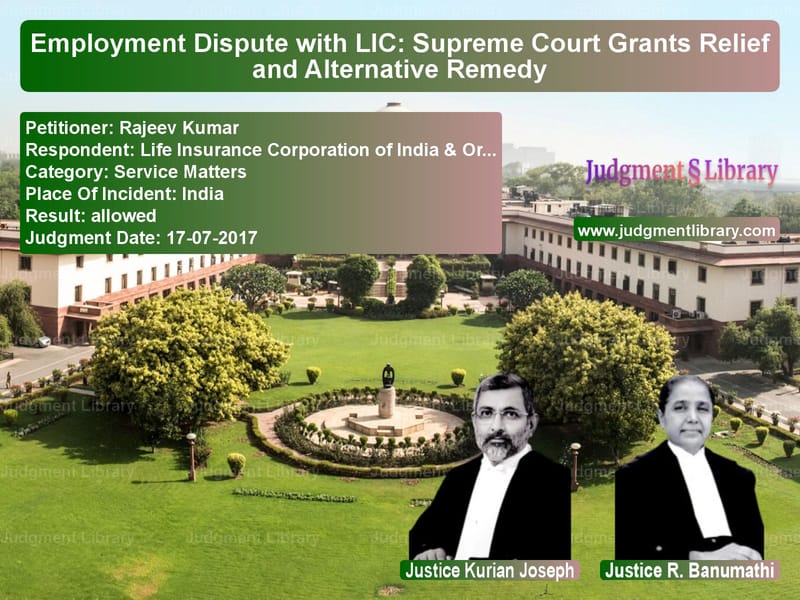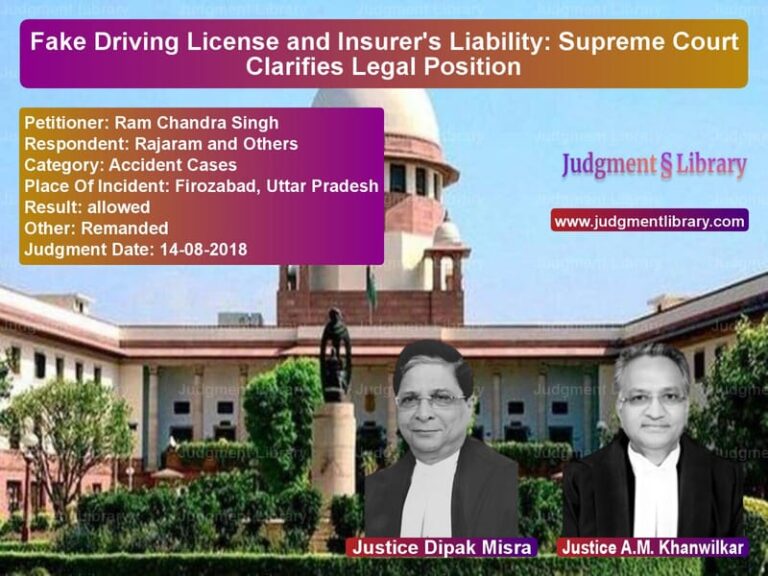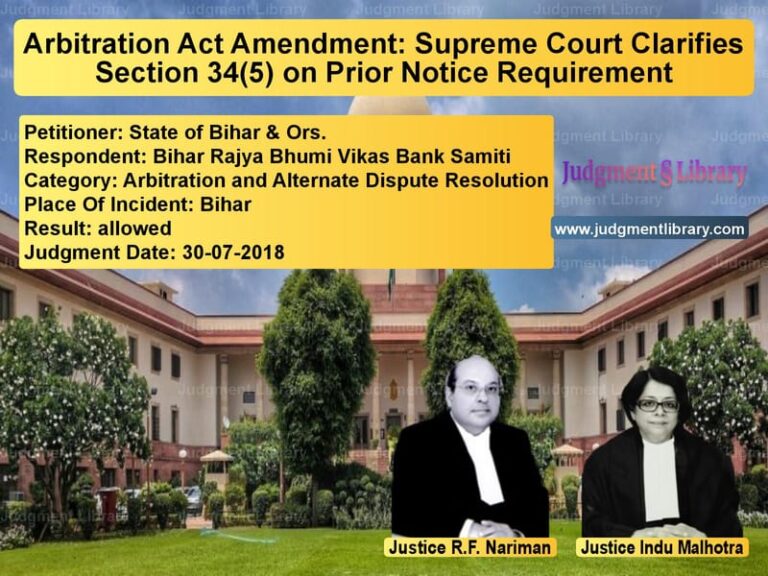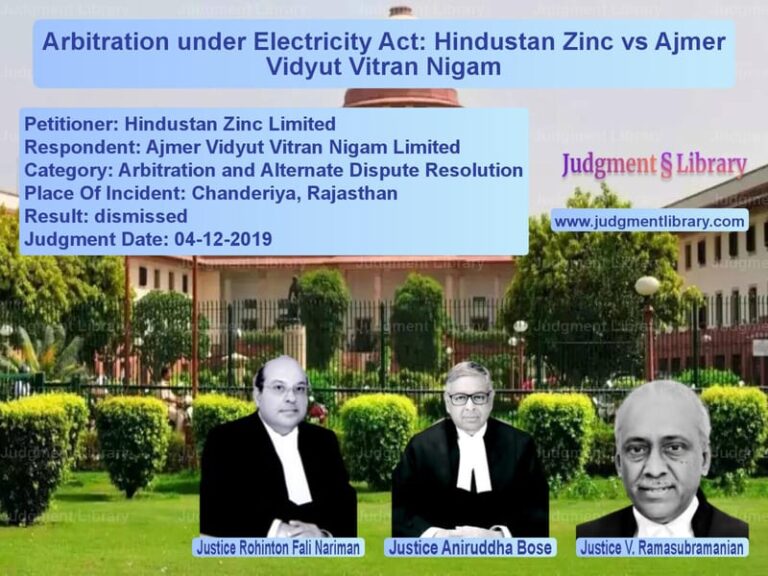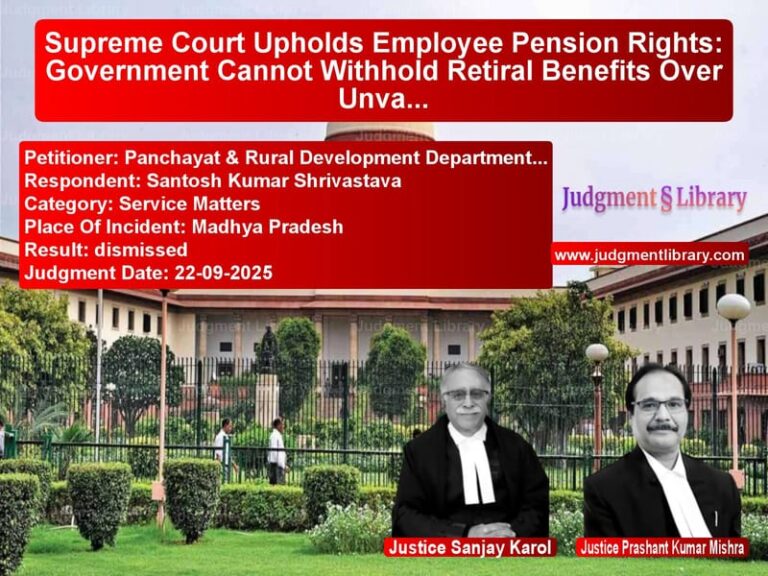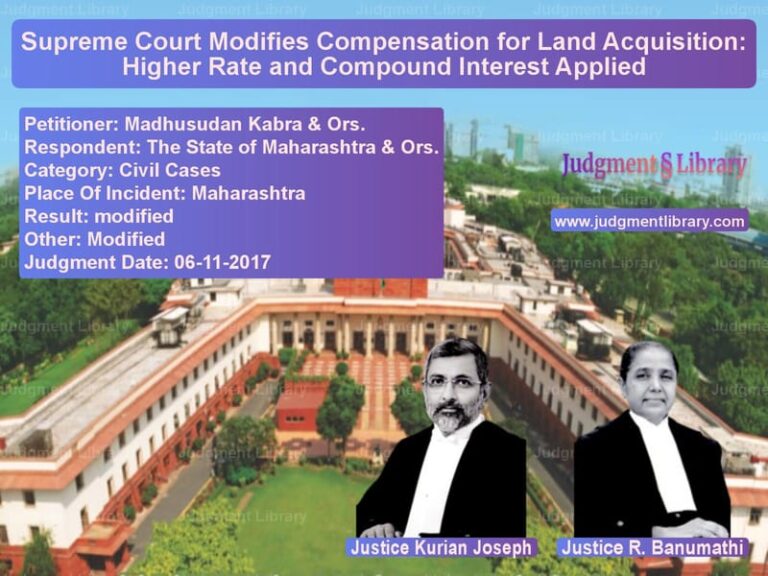Employment Dispute with LIC: Supreme Court Grants Relief and Alternative Remedy
The Supreme Court of India recently ruled in favor of Rajeev Kumar, granting him the opportunity to seek alternative remedies under the Industrial Disputes Act in his employment dispute with the Life Insurance Corporation of India (LIC). The case stemmed from the alleged wrongful denial of work by LIC and procedural delays in seeking legal recourse. This judgment highlights the importance of statutory remedies and the necessity of timely legal action.
Background of the Case
Rajeev Kumar, the appellant, approached the High Court of Allahabad after being denied work by LIC. Initially, the High Court granted interim relief, but later, it dismissed his petition on the grounds that he should pursue alternative remedies available under labor laws.
The appellant claimed that he was not informed about the High Court’s dismissal in time, resulting in a significant delay in filing an appeal before the Division Bench. When he eventually approached the Division Bench, the appeal was dismissed due to an eleven-year delay.
Rajeev Kumar then filed a special leave petition before the Supreme Court, seeking relief and reconsideration of his case.
Arguments of the Petitioner (Rajeev Kumar)
The petitioner argued that:
- He had been wrongfully denied work by LIC without justification.
- The High Court’s decision to direct him towards alternative remedies was not effectively communicated, leading to procedural delays.
- The Division Bench unfairly dismissed his appeal solely on the grounds of delay without considering the merits of his case.
- He should be granted an opportunity to seek justice through the alternative remedy as suggested by the High Court.
Arguments of the Respondent (Life Insurance Corporation of India)
LIC, represented by its legal counsel, countered with the following arguments:
- The appellant had been given due process to challenge his employment status through appropriate legal channels.
- The High Court had correctly ruled that the Industrial Disputes Act was the proper avenue for employment disputes of this nature.
- The appellant’s delay of more than eleven years in approaching the Division Bench was excessive and unjustified.
- The matter had already been settled by previous rulings, and further intervention was unwarranted.
Supreme Court’s Analysis and Judgment
The Supreme Court examined the procedural history of the case and emphasized the importance of allowing the appellant to exhaust all legal remedies available under statutory provisions.
The Court observed:
“Having regard to the submission of the learned counsel for the petitioner, we are of the view that the appellant, in the interest of justice, should be granted liberty to take recourse to the alternative remedy as pointed out by the learned Single Judge.”
Recognizing that the delay in filing the appeal before the Division Bench was primarily due to non-communication of the High Court’s judgment, the Supreme Court granted the appellant relief and issued the following directives:
- Rajeev Kumar was granted the liberty to pursue the alternative remedy under the Industrial Disputes Act.
- He was required to file his claim within two months from the date of the judgment.
- The adjudicating forum was directed not to dismiss his case on the grounds of delay.
- LIC was directed to cooperate in the proceedings before the Industrial Tribunal.
- The appeal was disposed of without any cost implications for either party.
Final Verdict
The Supreme Court allowed the appeal, enabling Rajeev Kumar to seek relief through the appropriate legal mechanism. The judgment ensures that employees have access to statutory remedies without being unfairly penalized for procedural delays.
Implications of the Judgment
This ruling has significant implications for employment disputes and labor law interpretation:
- Reinforces the principle that employees must first exhaust statutory remedies before approaching constitutional courts.
- Protects employees from procedural disadvantages arising due to non-communication of court decisions.
- Ensures fair access to labor dispute resolution mechanisms under the Industrial Disputes Act.
- Encourages employers and government bodies to resolve employment disputes within the framework of existing labor laws.
This judgment upholds procedural fairness in employment disputes and ensures that employees are not denied justice due to procedural technicalities.
Don’t miss out on the full details! Download the complete judgment in PDF format below and gain valuable insights instantly!
Download Judgment: Rajeev Kumar vs Life Insurance Corpo Supreme Court of India Judgment Dated 17-07-2017.pdf
Direct Downlaod Judgment: Direct downlaod this Judgment
See all petitions in Employment Disputes
See all petitions in Recruitment Policies
See all petitions in Public Sector Employees
See all petitions in Judgment by Kurian Joseph
See all petitions in Judgment by R. Banumathi
See all petitions in allowed
See all petitions in supreme court of India judgments July 2017
See all petitions in 2017 judgments
See all posts in Service Matters Category
See all allowed petitions in Service Matters Category
See all Dismissed petitions in Service Matters Category
See all partially allowed petitions in Service Matters Category

